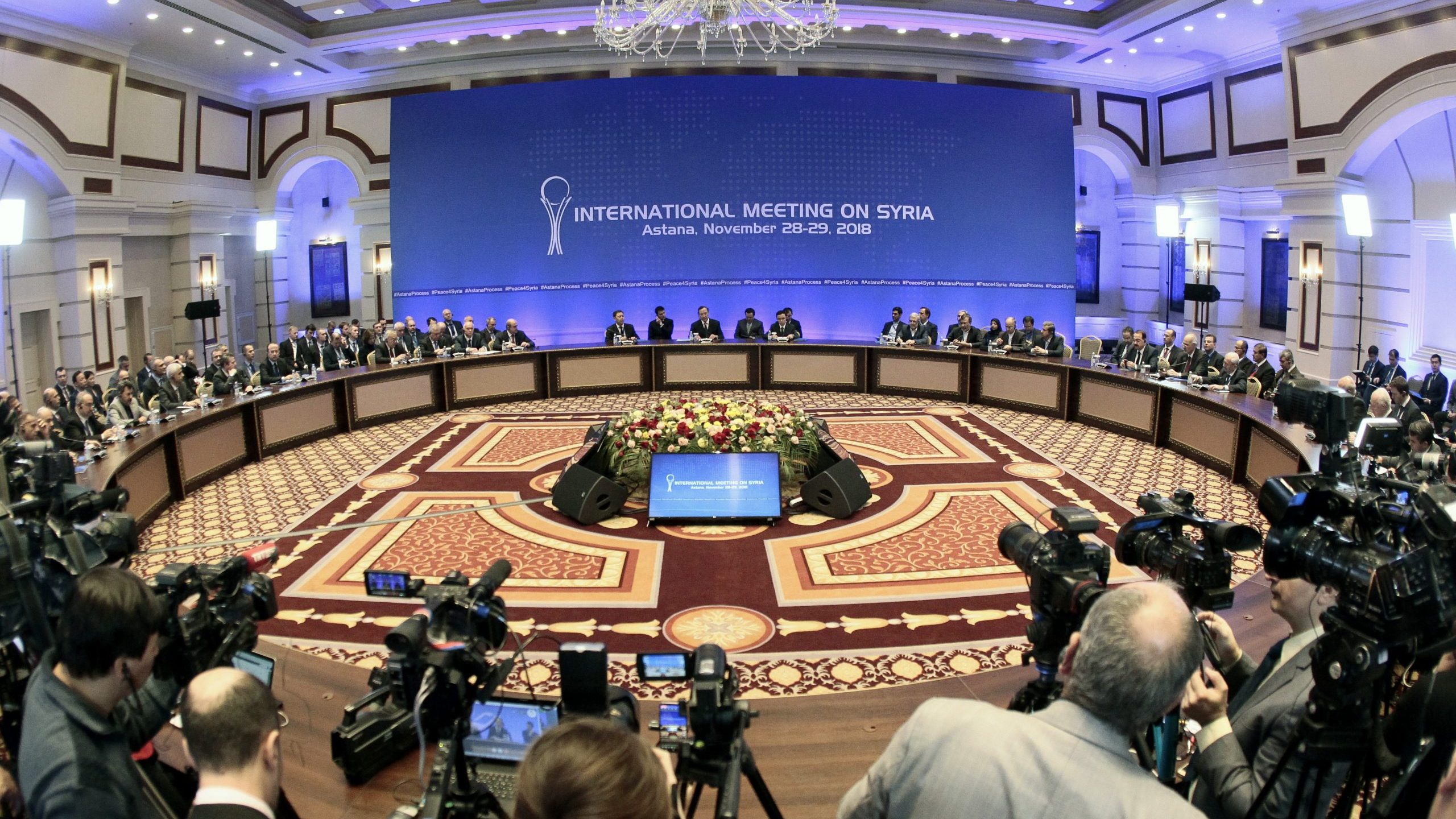The 18th session of Astana-format talks (Between Russia, Iran and Turkey) ended yesterday in the Kazakh capital Nur-Sultan. The statement issued by the guarantor countries of the Astana Process was very similar to the ones issued before it, indicating that no breakthrough was reached concerning a political solution in Syria. However, Moscow seized the opportunity to send political messages and threats to its western counterparts.
Turkey
Early on, on Wednesday, a session of official talks was held in the Kazakh capital this morning between the delegations of the Syrian Arab Republic headed by Dr. Ayman Sousan, Assistant Foreign and Expatriates Minister, and the delegation of the Russian Federation headed by Alexander Lavrentiev, the Russian President’s Special Envoy to Syria. According to the official agency SANA, Lavrentiev stressed Russia’s attachment to the sanctity and integrity of Syrian territory and the need to avoid any actions that violate Syrian sovereignty and escalate the situation in the region. He affirmed that Russia will continue to make all possible efforts to prevent the situation in Syria from “becoming complicated.” A reference to Turkey’s possible military operation in the North, where it is trying to create a safe zone to which refugees could return and push the Kurdish-led Syrian Democratic Forces away from its borders.
On the same day, according to the pan-arab website al-Araby al-Jadeed, Russia threatened to stop United Nations humanitarian aid from being delivered across the Turkish border into Syria. Moscow accused the West of not fulfilling promises to ease sanctions on the Assad regime in Damascus or implement reconstruction projects. “The West has not implemented all the commitments it promised a year ago regarding the implementation of reconstruction projects, so we will likely look at cancelling the cross-border aid system,” Russian presidential envoy to Syria Alexander Lavrentiev said, according to the Russian government media outlet Sputnik.
Moscow refers to the Bab al-Hawa crossing, the only entry point for United Nations aid into rebel-held areas of northwestern Syria for the past two years. The UN Security Council is scheduled to vote on a decision to extend the transfer of humanitarian aid across the border on July 10th – a decision NGO says will directly affect the lives of over 4 million people in Syria.
Political analyst Darwish Khalifa told Al-Araby Al-Jadeed that Russia’s threats were “mainly directed at Turkey, especially after it announced a military operation against [Kurdish-held] areas of northern Syria.”
“The Russian demand carries a clear blackmail of Turkey to increase pressure on it and to blame it for the deterioration of the economic situation in northern Syria, as it is the controlling guarantor in that region,” Khalifa added.
Has the solution in Syria come to an end?
In addition, according to the opposition website al-Hal Net, Laverntiev, said in a conference that Russia “believes it is necessary to choose a new venue for meetings of the Syrian Constitutional Committee instead of Geneva,” claiming that the city is “no longer neutral.” This means Russia has wholly swooped on the process, conducting it strictly with Russia’s strategic and special interests.
Samer Elias, an expert on Russian affairs, said that this statement confirms that Russia views the Astana track as the only path that led to political achievements, as envisaged by Russia. This perspective is in line with Assad’s recent statements, which he made to the Russia Today television channel, about the Constitutional Committee and its uselessness.
Former Syrian diplomat Bashar al-Hajj Ali, a member of the Constitutional Committee, told Al-Hal Net that Lavrentiev’s remarks are a direct threat to the political process in Syria. Hajj Ali said that the process clearly should not be disrupted, even though it has not yet proved productive.
Hajj Ali added that Russia and other actors continue to use Syria as a mailbox to deliver political messages related to Syria and other issues. These statements constitute a message to the West and Switzerland, which is not a member of the European Union but serves as the headquarters for many UN organizations.
Elias also noted that Russia aims to take a stand against the Swiss position on the issue of the Russian invasion of Ukraine.
During his press conference on Thursday, Lavrentiev claimed that the question of choosing another neutral venue for the constitutional committee’s next session of meetings resulted only from pre-existing logistical difficulties and Geneva’s loss of neutral status. He noted that the Geneva Russian delegation struggled to attend the meetings.
But according to Hajj Ali, Lavrentiev’s words do not reflect Russia’s position, as Russia seeks to change the political path that currently passes through the United Nations. Russia has indicated that this path will not survive; that is, the path of the Constitutional Committee. Russia is threatening to resile from all understandings regulating the joint presence of the various actors in Syria. This will result in the destabilization of the entire region.
According to Hajj Ali, it is not in Russia’s interest to terminate the search for a political solution in Syria. This is because What Russia has achieved through understandings on this issue with the West and with Turkey strengthens its presence in the international arena.


